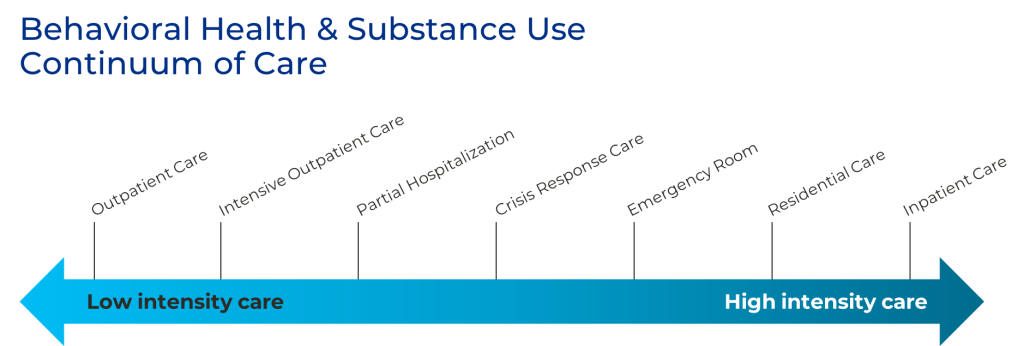Navigating the world of behavioral health care can be daunting, especially when it comes to inpatient treatment. By understanding typical treatment, what the typical length of an average stay in a hospital may be, and the importance of aftercare, families, patients, caregivers, and mental health advocates in the recovery process, it can help alleviate some of the concerns caused by the unknowns.
We’ve included some of the most common questions from patients and their families below. If you have additional questions about this process or other behavioral healthcare needs, please call the Behavioral Health Hotline at 1-833-TREATBH (873-2824).
What is an inpatient behavioral health or psychiatric hospital?
Inpatient behavioral health hospitals play a vital role in the mental health care system. These facilities are designed to provide intensive, round-the-clock care for individuals experiencing significant mental health symptoms. They offer a structured environment where patients can receive the support and treatment necessary to stabilize their condition during a crisis.
Patients benefit from a multidisciplinary team of healthcare professionals, including psychiatrists, psychologists, nurse practitioners, physician assistants, nurses, and therapists, all working together to develop a personalized treatment plan. This level of care is critical for those who require more than outpatient support can provide. Inpatient care focuses on stabilizing symptoms, providing therapeutic interventions and teaching coping strategies so the individual can safely transition to the next level of care. Patients leave with a sense of hope and a plan for ongoing treatment that helps them achieve a better quality of life.
What can one expect during a stay in an inpatient facility?
Understanding what to expect during an inpatient stay can alleviate some of the anxiety associated with hospitalization. Daily routines are structured to provide consistency and support for patients as they work towards recovery. The individual will also meet with their doctor and medications may be prescribed.
Mornings typically begin with breakfast followed by group therapy sessions, where patients can share experiences and learn from each other in a supportive environment. Afternoons may include individual therapy, medication management, and various therapeutic activities such as art, music or recreational therapy.
Former patients and caregivers stress the importance of actively participating in the treatment process. Engaging with therapists, attending all sessions, and being open to new experiences can significantly enhance the effectiveness of the inpatient experience. Building rapport with staff and fellow patients can also help create a sense of community and support during the stay.
What is a common length of stay at an inpatient behavioral health hospital?
When considering inpatient behavioral health care, one of the most common questions is, “How long will my stay be?” The length of stay can vary significantly depending on several factors, but understanding the norms can help set realistic expectations for both the patient and family.
The level of care and time to stabilization is developed by the multidisciplinary team and dependent on an individual’s specific needs, but a typical adult stay is one week. A typical child/adolescent or older adult patient stay is two weeks due to specialized needs during and after the hospitalization.
Several factors influence the length of stay in an inpatient setting:
- Patient progress is the most significant determinant. As individuals begin to respond to treatment, their stay may be adjusted accordingly.
- The complexity of the individual’s condition, if they exhibit multiple symptoms such as sadness and anxiety, the age of the patient, and the specific treatment plan devised by healthcare professionals, are key considerations.
What typically happens after a person is discharged from a psychiatric hospital?
Successfully transitioning from inpatient care back to everyday life is a crucial component of the recovery process. Planning for discharge begins well before the end of the stay, allowing patients and their families to prepare for the next steps.
A comprehensive discharge plan will typically include follow-up appointments with mental health professionals, such as therapists or psychiatrists, to ensure continuity of care. It may also involve connecting patients with community resources like support groups or outpatient programs designed to sustain progress made during inpatient treatment. Just as one treats a chronic, relapsing disease that affects their physical health, mental health conditions are best treated using a continuum of care which ranges from outpatient services to acute, hospital-based services.

Establishing a strong support network is essential for individuals leaving inpatient care. Family members, friends, and mental health advocates play a vital role in providing encouragement and accountability as patients continue on their recovery journey.
Common questions from patients or family members prior to an inpatient stay at one of our facilities:
How can patients prepare for an inpatient stay?
Before admission, patients should gather essential items like comfortable clothing, toiletries, and personal belongings that provide comfort. Additionally, understanding the facility’s policies and visiting hours can help set expectations for both the patient and their support network.
Are there any visiting restrictions for family and friends?
Visiting policies vary by facility, but most inpatient hospitals have designated visiting hours and guidelines to ensure a therapeutic environment. It’s essential to check with the hospital in advance to understand their specific rules and plan visits accordingly.
What is the role of family members during an inpatient stay?
Family members can offer invaluable support by maintaining communication with both the patient and the care team. Regular visits, phone calls, and involvement in family therapy sessions can strengthen relationships and aid in the recovery process.
Conclusion and Resources
Inpatient behavioral health care is a critical resource for individuals navigating severe mental health challenges. For those seeking further information and support, several resources are available:
- National Alliance on Mental Illness (NAMI)
- Mental Health America (MHA)
- The Substance Abuse and Mental Health Services Administration (SAMHSA)
These organizations offer a wealth of information, support networks, and advocacy opportunities for anyone affected by mental health conditions. Remember, recovery is a journey, and with the right support and resources, a brighter, healthier future is within reach.
